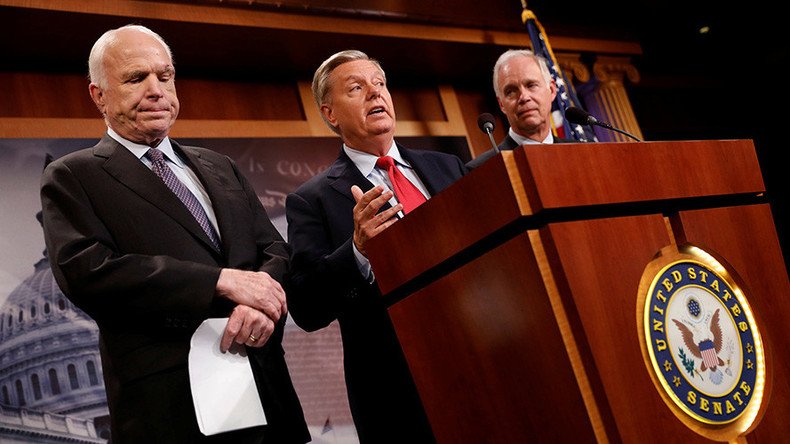GOP splits further as 'skinny' Obamacare repeal may get rewritten in conference

Four Republican senators are threatening an 11th hour vote on the Health Care Freedom Act, or “skinny” Obamacare repeal, ahead of the August recess. They want guarantees that this latest effort won’t be in the final version approved by the House.
The Health Care Freedom Act was finally released later Thursday evening by Senate Majority Leader Mitch McConnell (R-Kentucky), but even before the text was made public, Republicans expressed concerns that it wasn't ready to become law without further conferencing with the House. The bill temporarily repeals Obamacare's employer mandate until 2025 and cuts funding to abortion providers like Planned Parenthood for one year.
The Congressional Budget Office (CBO) projected 16 million more Americans would be uninsured under the plan.
Vice President Mike Pence has arrived at the US Capitol, where a midnight vote on the Health Care Freedom Act may require his vote to break a 50-50 tie.
VP Pence just arrived at US Capitol ahead of midnight Senate votes on heath care. pic.twitter.com/PUCDduOngL
— Craig Caplan (@CraigCaplan) July 28, 2017
Republican senators John McCain of Arizona, Ron Johnson of Wisconsin, Bill Cassidy of Louisiana and Lindsey Graham of South Carolina held a joint press conference earlier Thursday evening, announcing that they would vote no on the "skinny" bill if they did not have assurances from the House that it will first go to a conference committee before being passed.
“Here’s the problem, the whip in the House is suggesting to some that whatever we send becomes the final product, there will be no conference,” Graham said. “And I am not going to vote for the skinny bill if I’m not assured by the House there will be a conference where my idea and other ideas can be taken up so we can actually replace Obamacare.”
“I’m not going to vote for a bill that is terrible policy and horrible politics just because we have to get something done,” Graham added.
McCain called for bipartisanship, citing Obamacare, which he said was “rammed through Congress by Democrats without a single Republican vote.”
“We’ve got to have Republicans and Democrats sit down together and come up with a bill that gets a majority in both houses, otherwise we’re going to see this continuous gridlock,” McCain said. “It’s time we sat down together and came up with solutions that the American people overall would support.”
While a copy of the “skinny” bill has not been made available to lawmakers, House Speaker Paul Ryan (R-Wisconsin) did confirm that the bill currently includes a repeal of the employer mandates from Obamacare. The bill is also expected to cut federal funding to Planned Parenthood for one year.
Together, the senators have more than enough votes to block the “skinny” bill from going to the House, where it could be passed and then sent to President Donald Trump. By having a conference, the senators hope they can change the “skinny” bill before a final vote.
If the Senate does pass a bill, both chambers of Congress would have to approve whatever bill comes out of the House-Senate conference.
House Speaker Ryan issued a statement Thursday, saying that “If moving forward requires a conference committee, that is something the House is willing to do.”
“The House remains committed to finding a solution and working with our Senate colleagues, but the burden remains on the Senate to demonstrate that it is capable of passing something that keeps our promise, as the House has already done,” Ryan said.
However, McCain later told reporters that Ryan’s statement was “not sufficient” to garner his vote.
John McCain says Paul Ryan's statement is "not sufficient"
— Ben Jacobs (@Bencjacobs) July 28, 2017
Democrats argue that if the bill does contain cuts to Planned Parenthood, it would no longer meet the guidelines for reconciliation, a budget mechanism that allows Republicans to pass the bill with a simple majority of 51 votes, rather than 60 votes as normal Senate procedures require.
Senators Susan Collins (R-Maine) and Lisa Murkowski (R-Alaska) have both said that they would not vote for a measure that cuts Planned Parenthood.
The "skinny" bill is not expected to include any cuts to Medicaid, but cuts could be added once the bill is sent to conference Republicans.
While a handful of senators are calling for a conference, others want to vote on the “skinny” bill without any changes.
Senator Chris Murphy (R-Connecticut) said that the bill “isn’t going to conference, this is becoming law.”
“The White House doesn’t support a conference, the White House really likes the skinny bill and would like it to become law,” Murphy said, according to the Guardian.
Senate packs repeal bill w conservative priorities + Trump says he loves bill + House readies w martial law = THERE WILL BE NO CONFERENCE
— Chris Murphy (@ChrisMurphyCT) July 28, 2017
At Thursday’s press briefing, White House press secretary Sarah Huckabee Sanders confirmed that the White House likes the “skinny” bill, and said that they are re-branding it as the “freedom bill.”
“We actually like the term ‘freedom bill’ a lot better because we think it addresses what this bill actually is - it removes a lot of those mandates that allow people to have the type of freedom, have states have the freedom that they want. And that was one of the big priorities for this administration,” Huckabee Sanders said.
Another name for the skinny repeal? The "Freedom bill," Sanders says https://t.co/9ByVJlyjoY
— Meg Wagner (@megwagner) July 27, 2017
As Republicans attempt to pass their bill before the August recess, House Majority Leader Kevin McCarthy (R-California) sent an email to lawmakers Thursday, asking all member of Congress to “remain flexible in their travel plans over the next few days,” according to Politico.
One light of hope for the GOP came when the moderate Senator Rob Portman (R-Ohio) announced his support for the “skinny” repeal. However, he has also released a statement calling for a House-Senate conference, where anything could happen.
“I will support legislation to move this process to a House-Senate conference because I believe we need to repeal and replace Obamacare,” Portman said, adding that he will fight for “a better health care system that lowers the cost of coverage, provides access to quality care, and protects the most vulnerable in our society.”












